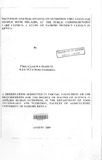| dc.contributor.author | Sakwa-ME | |
| dc.date.accessioned | 2013-05-15T13:04:39Z | |
| dc.date.available | 2013-05-15T13:04:39Z | |
| dc.date.issued | 2009-08 | |
| dc.identifier.citation | Sakwa-Madete, E(2009). Provision and perceptions on nutrition education for people with HIV/AIDS, at the public comprehensive care clinics: a study of Nairobi district clinics in Kenya | en |
| dc.identifier.uri | http://erepository.uonbi.ac.ke:8080/xmlui/handle/123456789/23263 | |
| dc.description | Msc Thesis | en |
| dc.description.abstract | As early as 2003, The Greater Horn of Africa Capacity Development Initiative in
Nutrition had already identified nutrition in HIV/AIDS as an area of capacity
development urgently needing attention. The Government of Kenya in collaboration with
multilateral and bilateral agencies spearheaded the development of the "Kenya National
Guidelines on nutrition and HIV IAIDS" for use in the Comprehensive Care Clinics for
harmonised nutritional strategies.
This non intervention cross-sectional study was carried out to analyse the nutrition
education offered in the Public Comprehensive Care Clinics. Its objectives were to
examine the nutrition education in the clinics and establish the nutrition education
support materials being used. Levels of awareness of the roles of diet in the management
of HIV IAIDS by clients in the clinics were also explored and perceptions of both the
nutrition educators and their clients on the nutrition education offered were sought.
One hundred and fifty two clients infected with the HIV IAIDS virus and five nutrition
educators in three clinics were interviewed. Data was collected using structured pretested
and modified questionnaires, focus group discussions and observations. The
client's dietary diversity was determined through the Individual Food Dietary Diversity
questionnaires.
The results indicated that generally more females than males attended these clinics and a
majority of the clients (93.4%) had some formal school education. The clients attending
xix
the clinics were relatively young adults with a mean age of 35.7 years (SD=8.17). The
BMI were within the normal limits for majority of the clients (64%). Correlation
Analysis and Analysis of Variance tests did not reveal any significant relationship
(p>O.05) between BMI and the clients socio-dernographic characteristics. There was a
significant association p<O.05 (p=O.OOl) between perceptions of nutrition education and
knowledge of key nutritional practices for People with HIV/AIDS. The Individual Food
Dietary Diversity Questionnaire (mean score=7) revealed that consumption of foods by
the clients was not very diversified implying their diets were likely to be nutritionally
deficient.
Though nutrition educators expressed satisfaction with their work they were frustrated by
lack of adequate tools, insufficient materials, heavy workloads and lack of private space
to carry out nutrition education sessions. The recommended nutritional guidelines,
information, education and communication materials were not available in the clinics and
accordingly they had not been used in the nutrition education sessions.
The study concluded that the nutrition education services offered to People With
HIVIAIDS in the public Comprehensive Care Clinics are inadequate. The finding led to
the recommendation that Ministry of Health should address the issues of understaffing of
nutrition educators in the clinics. There is also need for a concerted effort to frequently
monitor the provision of nutrition education in the clinics to ensure adherence to the stated
government protocols and harmonised intervention strategies. In addition nutrition
educators should be meticulously trained on application of guidelines and protocols in the
management of nutrition for their clients. | en |
| dc.language.iso | en | en |
| dc.subject | Nutrition Education | en |
| dc.subject | HiV/AIDS | en |
| dc.subject | Public comprehensive clinics | en |
| dc.subject | District clinics | en |
| dc.subject | Nairobi | en |
| dc.subject | Kenya | en |
| dc.title | Provision and perceptions on nutrition education for people with HIV/AIDS, at the public comprehensive care clinics: a study of Nairobi district clinics in Kenya | en |
| dc.type | Thesis | en |
| local.publisher | Department of Food Science, Nutrition and Technology, University of Nairobi | en |

